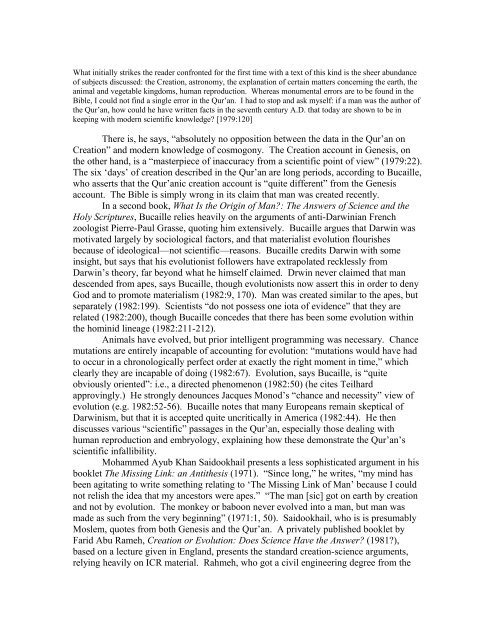Creationism - National Center for Science Education
Creationism - National Center for Science Education
Creationism - National Center for Science Education
Create successful ePaper yourself
Turn your PDF publications into a flip-book with our unique Google optimized e-Paper software.
What initially strikes the reader confronted <strong>for</strong> the first time with a text of this kind is the sheer abundance<br />
of subjects discussed: the Creation, astronomy, the explanation of certain matters concerning the earth, the<br />
animal and vegetable kingdoms, human reproduction. Whereas monumental errors are to be found in the<br />
Bible, I could not find a single error in the Qur’an. I had to stop and ask myself: if a man was the author of<br />
the Qur’an, how could he have written facts in the seventh century A.D. that today are shown to be in<br />
keeping with modern scientific knowledge? [1979:120]<br />
There is, he says, “absolutely no opposition between the data in the Qur’an on<br />
Creation” and modern knowledge of cosmogony. The Creation account in Genesis, on<br />
the other hand, is a “masterpiece of inaccuracy from a scientific point of view” (1979:22).<br />
The six ‘days’ of creation described in the Qur’an are long periods, according to Bucaille,<br />
who asserts that the Qur’anic creation account is “quite different” from the Genesis<br />
account. The Bible is simply wrong in its claim that man was created recently.<br />
In a second book, What Is the Origin of Man?: The Answers of <strong>Science</strong> and the<br />
Holy Scriptures, Bucaille relies heavily on the arguments of anti-Darwinian French<br />
zoologist Pierre-Paul Grasse, quoting him extensively. Bucaille argues that Darwin was<br />
motivated largely by sociological factors, and that materialist evolution flourishes<br />
because of ideological—not scientific—reasons. Bucaille credits Darwin with some<br />
insight, but says that his evolutionist followers have extrapolated recklessly from<br />
Darwin’s theory, far beyond what he himself claimed. Drwin never claimed that man<br />
descended from apes, says Bucaille, though evolutionists now assert this in order to deny<br />
God and to promote materialism (1982:9, 170). Man was created similar to the apes, but<br />
separately (1982:199). Scientists “do not possess one iota of evidence” that they are<br />
related (1982:200), though Bucaille concedes that there has been some evolution within<br />
the hominid lineage (1982:211-212).<br />
Animals have evolved, but prior intelligent programming was necessary. Chance<br />
mutations are entirely incapable of accounting <strong>for</strong> evolution: “mutations would have had<br />
to occur in a chronologically perfect order at exactly the right moment in time,” which<br />
clearly they are incapable of doing (1982:67). Evolution, says Bucaille, is “quite<br />
obviously oriented”: i.e., a directed phenomenon (1982:50) (he cites Teilhard<br />
approvingly.) He strongly denounces Jacques Monod’s “chance and necessity” view of<br />
evolution (e.g. 1982:52-56). Bucaille notes that many Europeans remain skeptical of<br />
Darwinism, but that it is accepted quite uncritically in America (1982:44). He then<br />
discusses various “scientific” passages in the Qur’an, especially those dealing with<br />
human reproduction and embryology, explaining how these demonstrate the Qur’an’s<br />
scientific infallibility.<br />
Mohammed Ayub Khan Saidookhail presents a less sophisticated argument in his<br />
booklet The Missing Link: an Antithesis (1971). “Since long,” he writes, “my mind has<br />
been agitating to write something relating to ‘The Missing Link of Man’ because I could<br />
not relish the idea that my ancestors were apes.” “The man [sic] got on earth by creation<br />
and not by evolution. The monkey or baboon never evolved into a man, but man was<br />
made as such from the very beginning” (1971:1, 50). Saidookhail, who is is presumably<br />
Moslem, quotes from both Genesis and the Qur’an. A privately published booklet by<br />
Farid Abu Rameh, Creation or Evolution: Does <strong>Science</strong> Have the Answer? (1981?),<br />
based on a lecture given in England, presents the standard creation-science arguments,<br />
relying heavily on ICR material. Rahmeh, who got a civil engineering degree from the

















